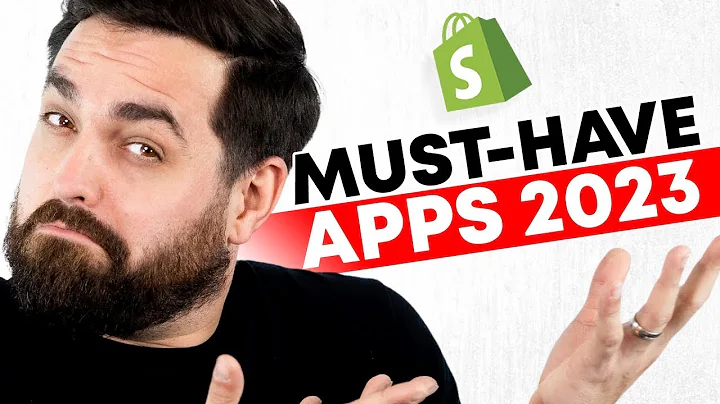Maximize Your B2B Sales on Shopify
Table of Contents
- Introduction
- Understanding Wholesale and B2B
- 2.1. What is Wholesale?
- 2.2. What is B2B?
- The Wholesale Channel
- 3.1. Features of the Wholesale Channel
- Shopify B2B
- 4.1. Introduction to Shopify B2B
- 4.2. Benefits of Shopify B2B
- Choosing Between Wholesale and B2B
- 5.1. Considerations for Choosing
- 5.2. Using a Blended or Dedicated Store
- Setting up B2B on Shopify
- 6.1. Checklist for Setting up B2B
- 6.2. Creating a Test Account for B2B
- Customizations and Features of B2B
- 7.1. Integrating B2B with Store Themes
- 7.2. Exclusive B2B Features
- Enhancing Security with B2B
- 8.1. Secure Customer Account Profile
- 8.2. Benefits of the New Customer Account Profile
- Utilizing B2B Features for Content
- 9.1. Tailoring Content for B2B Customers
- 9.2. Creating B2B-specific Pages and Content
- Conclusion
- Contacting Merchant Success Team
Understanding Wholesale and B2B
In the world of e-commerce, the terms "wholesale" and "B2B" are often used interchangeably. However, in the context of Shopify, these two terms represent distinct features that cater to different business-to-business selling experiences. In this article, we will delve into the nuances of both wholesale and B2B on Shopify, highlighting their features, benefits, and considerations.
The Wholesale Channel
The wholesale channel in Shopify is a separate sales channel that offers a unique buying experience for wholesale buyers. Unlike the standard online store, the wholesale channel operates independently, without interactions with themes, apps, and customizations. This channel provides a structured grid experience, streamlining the purchasing process for wholesale customers. However, it lacks the flexibility and customization options available in the regular online store setup.
Shopify B2B
Shopify B2B, on the other hand, is an integrated feature offered within the Shopify admin. It can be used as an overlay on your direct-to-consumer (D2C) store or as a dedicated B2B selling platform. With Shopify B2B, you have the flexibility to choose between a blended store that caters to both B2B and regular customers or a dedicated store solely focused on B2B sales. The B2B feature has been continuously updated and enhanced, with more exciting features planned for future releases.
Choosing Between Wholesale and B2B
When deciding which approach to adopt for your B2B sales, it is essential to consider various factors. The nature of your business, your customer base, and your specific requirements should guide your decision. Shopify B2B offers a more integrated and user-friendly experience, making it a preferred choice for many merchants. However, if you have unique wholesale needs or prefer a more structured grid experience, the wholesale channel might be the right fit for you.
Setting up B2B on Shopify
To set up B2B on Shopify, it is crucial to follow a comprehensive checklist to ensure a smooth implementation. This checklist covers considerations such as choosing between a blended or dedicated store, configuring pricing, managing inventory, and setting up customer accounts. By following these steps, you can seamlessly integrate B2B features into your existing D2C store and provide a personalized buying experience for your B2B customers.
Customizations and Features of B2B
One of the key advantages of using Shopify B2B is the ability to customize and tailor the experience for your B2B customers. You can modify your store's theme to recognize B2B customer tags and display relevant content and product options specific to B2B buyers. Whether it's highlighting pack sizing on product pages or creating dedicated pages explaining your B2B sales process, you have the flexibility to provide a curated experience catered to your B2B audience.
Enhancing Security with B2B
Security is paramount when it comes to B2B transactions. Shopify B2B introduces a more secure customer account profile system. Instead of the traditional email and password combination, B2B customers receive a unique code via email. This code-based authentication process adds an extra layer of security, ensuring authorized access for B2B buyers. Merchants can also choose to implement this new customer account profile system in their D2C store to enhance overall security.
Utilizing B2B Features for Content
In addition to the streamlined buying experience, B2B features can be utilized to enhance your content strategy. By recognizing B2B customer tags, you can create B2B-specific content, such as informative pages, guides, and FAQs tailored to the needs of B2B buyers. This targeted content helps educate and support your B2B customers, enabling them to navigate and make informed decisions within the B2B buying experience.
Conclusion
Shopify offers two robust features, wholesale and B2B, for merchants looking to tap into the B2B market. While wholesale provides a structured grid experience, Shopify B2B offers a more integrated and customizable solution. Consider your business requirements, customer base, and desired features to choose the most suitable approach. With the support of the Merchant Success team and Shopify's extensive documentation, you can successfully implement and utilize these features to drive your B2B sales.
Contacting Merchant Success Team
If you have any questions or need assistance with wholesale, B2B, or any technical aspects, reach out to our dedicated Merchant Success team. They can address your queries, provide guidance, and help you navigate your strategy for implementing B2B successfully. Feel free to contact our Plus support team for technical inquiries or to schedule a strategy conversation with your Merchant Success team. We are here to support you every step of the way.
Highlights
- Shopify offers two distinct features for B2B selling: the Wholesale Channel and Shopify B2B.
- The Wholesale Channel provides a structured grid experience, while Shopify B2B offers a more integrated and customizable solution.
- Choosing between Wholesale and B2B depends on your business requirements, customer base, and desired features.
- Shopify B2B allows for enhanced security with its unique code-based customer authentication system.
- B2B features can be utilized to tailor content specifically for B2B customers, improving their buying experience.
FAQ
Q: What is the difference between the Wholesale Channel and Shopify B2B?
A: The Wholesale Channel offers a separate sales channel with a structured grid experience, while Shopify B2B provides a more integrated and customizable solution within the Shopify admin.
Q: How can I enhance security for B2B transactions?
A: Shopify B2B introduces a new customer account profile system that uses code-based authentication instead of a traditional email and password combination, improving security for B2B buyers.
Q: Can I customize my store's theme for B2B customers?
A: Yes, with Shopify B2B, you can modify your store's theme to recognize B2B customer tags and display customized content and product options tailored to B2B buyers.
Q: Which approach should I choose for my B2B sales?
A: The choice between Wholesale and B2B depends on factors such as your business requirements, customer base, and desired features. Consider whether you prefer a structured grid experience or a more integrated and customizable solution.






















